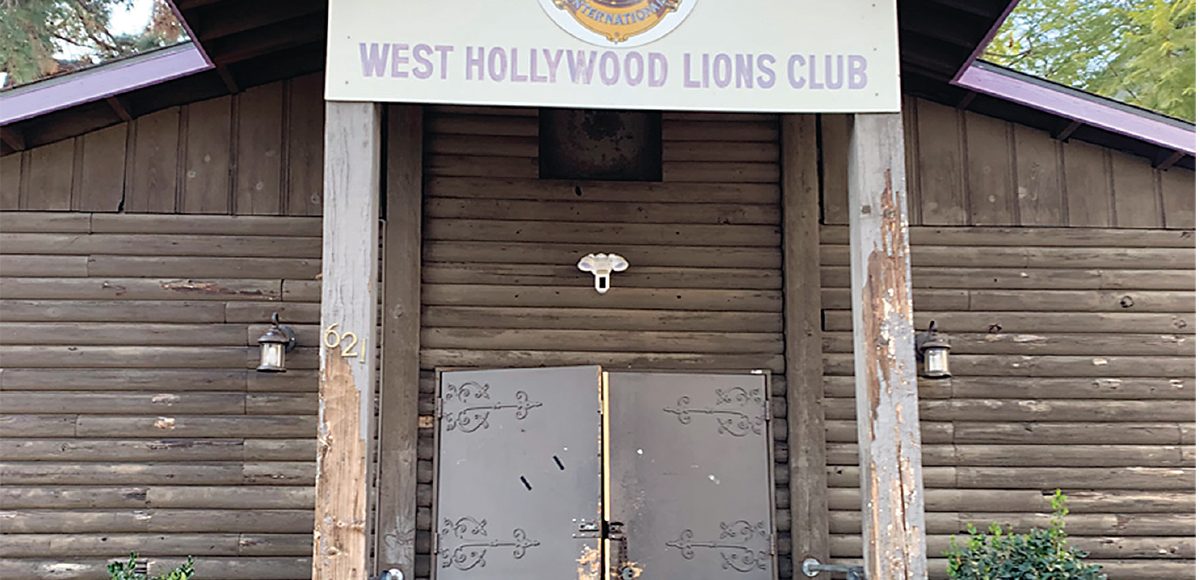There’s a saying in the sobriety community, recovery happens every day.
At the “Log Cabin” in West Hollywood, 29 meetings each week offer those searching for sobriety or reaffirming their commitment to a sober life a place to gather and grow stronger. However, that may soon end following a demand by the City of Beverly Hills, which owns the land, that those who use the property vacate it by the end of March.
“We currently have a situation in which we have a building that we don’t have a responsible party dealing with it,” said City Manager George Chavez in reference to the fact that there is no lease agreement in place. “Our primary concern is the safety within the building.”
Built sometime between 1928 and 1939 at 621 N. Robertson Blvd. in rustic log cabin architectural style for the Boy Scouts of America Troop 27, the property eventually became home to the Lions Club of West Hollywood.
For decades, the Lions Club allowed recovery meetings to take place inside the building. However, the last time the Lions Club had a lease with the City was 45 years ago, Chavez said.
City spokesperson Keith Sterling said the City has offered to meet with the Lions Club to provide alternative locations for meeting space, but the Club has yet to request a meeting. He said that negotiations for the City of West Hollywood to purchase the property proved unsuccessful.
A Jan. 13 joint press release issued by the cities of Beverly Hills and West Hollywood stated that they were in discussions to determine a “shared approach” to the property.
At the Jan. 28 Beverly Hills City Council meeting Study Session, dozens of people used public comment to urge the Council to take action to preserve the Log Cabin and allow it to continue to be used as a meeting place for groups such as Alcoholics Anonymous that help people recover from addictions.
“The Log Cabin is an iconic facility that has saved countless thousands upon thousands upon thousands of people,” said Beverly Hills Merrill Lynch Senior Vice President Kenny Lombino, who counts 37 years sober. “I would urge the City of Beverly Hills to do everything it could to come to an agreement that could benefit everybody.”
Immediately following the study session, the Council met in closed session with the West Hollywood Recovery Center about the possibility of them taking over the lease and continuing services there.
Sterling told the Courier that discussions continue but would not elaborate further as to what the City Council discussed in its closed session meeting which followed the study session.
A change.org petition to save the Log Cabin had gathered over 25,000 signatures as of press time. The petition states: “Losing the Log Cabin would be a detriment to the Public Health and Safety of the Beverly Hills and West Hollywood communities because it serves as a safe space for sobriety and recovery groups.”
Brent Bolthouse, a successful event producer who helped start the petition and counts 33 years sober, addressed the City Council during public comment.
“What makes the Log Cabin really special…is that you can go to a meeting there, all day and all night,” he said. “My friend Sia, the Grammy-Award winning artist, says, ‘Hey Beverly Hills (and) West Hollywood, I’m happy to pay for upgrades to the Log Cabin to bring it up to code and also start the process of declaring it an historical landmark. It saved my life. It’s the least I can do.'”
At the Jan. 28 Council meeting, West Hollywood City Councilman John Duran advocated on behalf of the West Hollywood Recovery Center securing a lease at the Log Cabin to run meetings. The Recovery Center, which is located across the street from the Log Cabin on Robertson, currently offers 70 meetings a week at that property.
“We’re fully capable of doing the same thing at the Log Cabin should you wish us to,” said David Van Der Velde, President of the Board of the Recovery Center.
Local businessman Robbie Anderson, whose great grandmother Margaret Anderson built the Beverly Hills Hotel, advocated on behalf of the Log Cabin. He characterized the building (and the work that transpires inside) as life-saving, noting that he had been attending meetings there for 40 years.
“I would really appreciate it if you give the West Hollywood Recovery Center a lease for 10 years at $1 a year,” he said. “I hope you do the right thing.”







